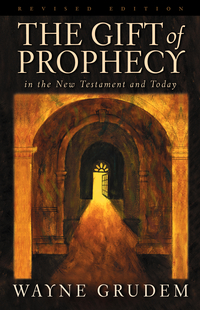The Duration of Prophecy: How Long Will Prophecy Be Used in the Church? (Part 2) by Wayne A. Grudem
Part 2 of Professor Grudem’s exegetical study of 1 Corinthians 13. The Duration of Prophecy: How Long Will Prophecy Be Used in the Church?

“The Duration of Prophecy” is Chapter 12 from The Gift of Prophecy in the New Testament and Today by Wayne A. Grudem.
Objections to This Interpretation
Various objections to this conclusion have been raised, usually by those who hold that the gift of prophecy has ceased in the church and should no longer be used. In this section, we shall examine those objections one at a time. Some of them deal with 1 Corinthians 13:8-13 specifically, and others deal with broader concerns.
1. “This passage does not specify when the gifts will cease”
The first objection to our conclusion above comes from Richard Gaffin’s thoughtful study, Perspectives on Pentecost. While Gaffin agrees that “when the perfect comes” refers to the time of Christ’s return, he does not think that this verse specifies the time of the cessation of certain gifts. He thinks, rather, that Paul is just viewing “the entire period until Christ’s return, without regard to whether or not discontinuities may intervene during the course of this period.”4
In fact, Gaffin argues, Paul’s overall purpose is to emphasize the enduring qualities of faith, hope, and love, especially love, and not to specify the time in which certain gifts will cease. He says:
Paul is not intending to specify the time when any particular mode will cease. What he does affirm is the termination of the believer’s present, fragmentary knowledge . . . when “the perfect” comes. The time of the cessation of prophecy and tongues is an open question so far as this passage is concerned and will have to be decided on the basis of other passages and considerations.5
Would it be persuasive to argue as follows: “We can be sure that love will never end, for we know that it will last more than thirty-five years!”?
In response to this objection it must be said that it does not do justice to the actual words of the text. Evangelicals have rightly insisted (and I know that Gaffin agrees with this) that passages of Scripture are true not only in the main point of each passage, but also in the minor details that are affirmed as well. The main point of the passage may well be that love lasts forever, but another point, and certainly an important one as well, is that verse 10 affirms, not just that these imperfect gifts will cease sometime, but that they will cease “when the perfect comes.” Paul specifies a certain time: “When the perfect comes, the imperfect will pass away” (1 Cor. 13:10, rsv). But Gaffin seems to claim that Paul is not actually saying this. Yet the force of the words cannot be avoided by affirming the overall theme of the larger context instead.
Category: Spirit, Summer 2001


